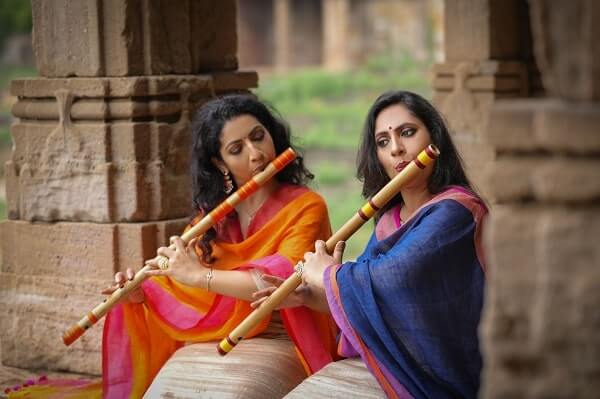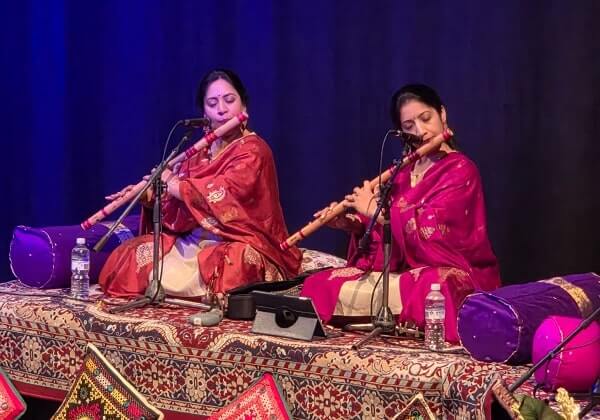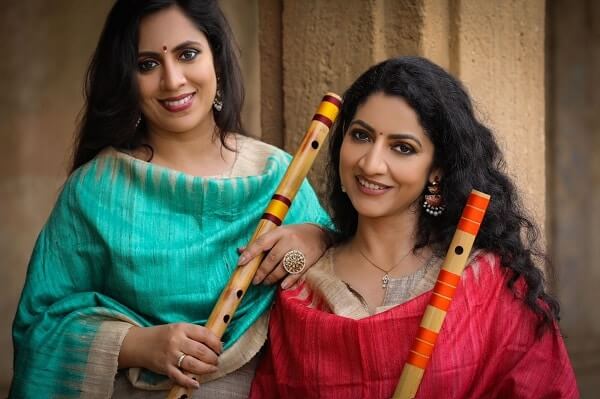The performance by the Flute Sisters Suchismita and Debopriya at this year’s Adelaide Fringe festival provided a rare opportunity for many local music enthusiasts to connect with soul-touching classical Indian flute music. Antardhyan (Sanskrit for ‘looking inward’, or ‘contemplation of one’s self’), was an apt title for their spiritually enriching concert on bamboo flutes.
Bamboo flutes have been a part of many civilizations across the world for thousands of years. The early humans in places with ready access to bamboo, including India, could easily make the connection between nature and music with the creation of this primeval and simple musical instrument.
In India, the bamboo flute has been part of the culture since the Vedic era, known by many names, including bansuri, murali, vansi and venu. Most famously, Hinduism’s beloved divinity Krishna is deeply linked with this instrument – which he used to enchant his chief consort, Radha. Following this association, it is no surprise to note that mastering this divine instrument has traditionally remained the preserve of male flautists in India.
But that scenario seems to be changing. True, even today a web-search brings up only four names of female Indian flautists. Nevertheless, it is a promising start of a new trend in traditional Indian flute music.
Undoubtedly, the credit for this development goes to pioneers Suchismita and Debopriya for their determination and hard work mastering the techniques of flute-playing. Decades earlier, their parents Robin and Krishna Chatterjee, both well-known composers and vocalists themselves, dared to dream beyond the subtle but potent gender boundaries in the world of traditional Indian music, and confidently placed bansuris in the hands of their young daughters instead of the more conforming veena or sitar instruments.
The sisters started with lessons on the bansuri as young children growing up in Prayagraj, known then as Allahabad, and their first formal tutor was Pandit Bholanath Prasanna. Their move to Mumbai in the nineties provided the opportunity to enhance their mastery at the feet of the legendary Pandit Hariprasad Chaurasia himself. And the rest is history.

What is the key to the success of the Flute Sisters?
Suchismita and Debopriya have created a unique musical entity that stands out. The siblings carry a discernable aura of geniality and wholesomeness on their personas that connects well with their audience. Dressed in well-coordinated Indian attire on music platforms, they radiate an alluring picture of their roots and traditions that touches hearts.
At the concert in Adelaide’s Theatre One at The Parks, the flautists’ performance echoed the spirit of the maestro Pandit Hariprasad Chaurasia – whose disciples they remain to this day – and reflected the positivity for life that they have so deeply imbibed from him.
Bandishes or compositions in the Hindustani Raga Bageshwari, a night-time raga, formed the main repertoire of the artists that evening. This was followed with a mix of relatively shorter plays in various traditions of music. The Carnatic Raga Hansdhwani, another evening raga, rang out an uplifting refrain from an old Hindi movie tune Jaa Tose Nahi Bolu Kanhaiya. Next came a medley of delightful folk tunes of Bengal, “because we are Bengalis” as Suchismita explained. The melodious tune of a bhajan dedicated to the divine flute-player Krishna brought a soul-stirring close to the evening’s mesmerizing fare.
This was music that was magnificently expressed, with the flautists displaying excellent command on their instruments, at perfect ease anticipating each other’s improvisations, and effortlessly complementing the other’s leads. Jugalbandi in supreme harmony!

Talented local youngster Karthik Shenoy provided masterful percussion support playing on his gleaming tabla set. The deep drone of the electronic tanpura provided an engaging backdrop throughout.
Pioneering with playing North Indian classical music on bamboo flutes at a time when there were practically no female flautists to gather inspiration from, the Flute Sisters have now become role models for anyone wishing to embark on the enchanting musical voyage with this time-honoured instrument.
READ ALSO: Why NOT English, Vibhinna says, when asked Why English?




